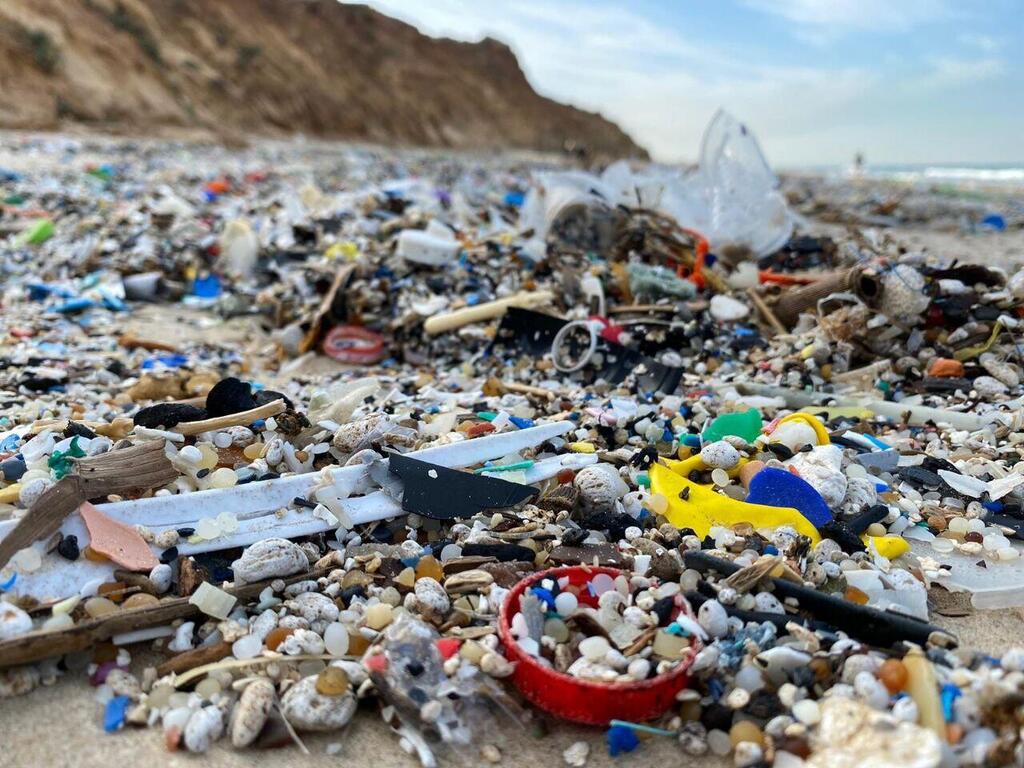Heaps of waste wash onto Gador Sea Reserve
(Video: Noga Gavrieli, EcoOcean)
Disposing of waste, even into the Mediterranean Sea, does not make it vanish. Footage from Israel's Gador Sea Reserve reveals the troubling issue of plastic pollution, which persistently affects Israel's shores.
Read more:
The Environmental Protection Ministry has reported that an astounding 8 million tons of waste are dumped into the sea annually. Israel's struggle with plastic waste has worsened since Finance Minister Bezalel Smotrich repealed the plastic tax instituted by his predecessor, Avigdor Liberman.
4 View gallery


Heaps of waste washed up on Israel's Gador Sea Reserve
(Photo: Noga Gavrieli, EcoOcean)
The use of plastic poses significant harm to animals and ecosystems. The United Nations' recently released environmental report on the Mediterranean for 2022 reveals that single-use plastics account for over 60% of the total marine litter found on beaches. Additionally, plastic constitutes 50% of the waste on the seabed.
Waste accumulation occurs not only on beaches but also on the seabed. Monitoring since 2017 has consistently shown a significant buildup of plastic waste in a strip 200 meters deep. The concentration of plastic at this depth is substantially higher than that found at shallower depths on the continental shelf.
Remarkably, plastic pollution extends to regions of the Mediterranean Sea that are beyond human reach, with waste discovered at depths of 1,100 to 1,300 meters, reaching the bottom of the sea.
EcoOcean, an Israeli nonprofit dedicated to preserving the marine and coastal environment, is raising alarms about the consequences of single-use plastic usage on beaches and in nearby businesses. The group is actively working to raise awareness about the harm caused by plastic pollution in the sea and beaches, aiming to shift public behavior regarding plastic use on beaches.
"Single-use dishes are washed into the sea and break down into small plastic particles—microplastics," says Itamar Avishay, developer of the Coasts program at EcoOcean.
"Besides the toxicity of the plastic itself, which affects the body's hormonal system, the plastic absorbs pollutants from the environment due to its chemical properties. Plastic particles infiltrate the food system and today plastic can be found in the bodies of marine and terrestrial animals, in the water, in the soil and in the air. Tiny plastic particles have been found in breast milk."
4 View gallery


Former Finance Minister Lieberman taxed plastics and current Finance Minister Smotrich canceled tax
(Photo: Moti Kimchi, Amit Shabi)
What measures are being taken in Israel to curb plastic usage? Seemingly, not many. In January 2023, Finance Minister Smotrich issued an order to revoke the tax on plastics, a move that drew widespread criticism, including from the Union of Public Health Physicians and the Union of Veterinary Doctors. They penned a letter to the members of the Knesset Finance Committee, urging them not to back the policy promoting single-use plastics, citing the need "to protect the health of the people and the environment."
A survey commissioned by environmental groups found that, in the year prior to the taxation of single-use plastics, around 11 billion single-use plastic items were used, equating to approximately 1,200 items per person annually.
Following the implementation of the tax, there was an 18% reduction in plastic usage along the country's shores and a dramatic 90% decline in the consumption of large plastic bottles.
Consequently, the tax led to a nearly 40% decrease in the overall consumption of single-use plastics. This data was presented to the government in January, even before the Finance Minister revoked the tax.
Tomer Gertel, head of government relations for Green Course, highlighted that Israel ranks second globally in plastic consumption. "The average Israeli uses five times more plastic than their European counterparts, and we are all suffering the consequences with pollution in every corner," he said.
"Rather than progressing, Finance Minister Bezalel Smotrich's first step was to abolish the tax on single-use plastics. Without regulation and a clear policy to reduce plastic use, as seen across the Western world, the government is not only aggravating the waste problem but also intensifying the health crisis and harming nature, wildlife and public health. Without appropriate interventions, this manageable issue could escalate into a terrifying reality."






